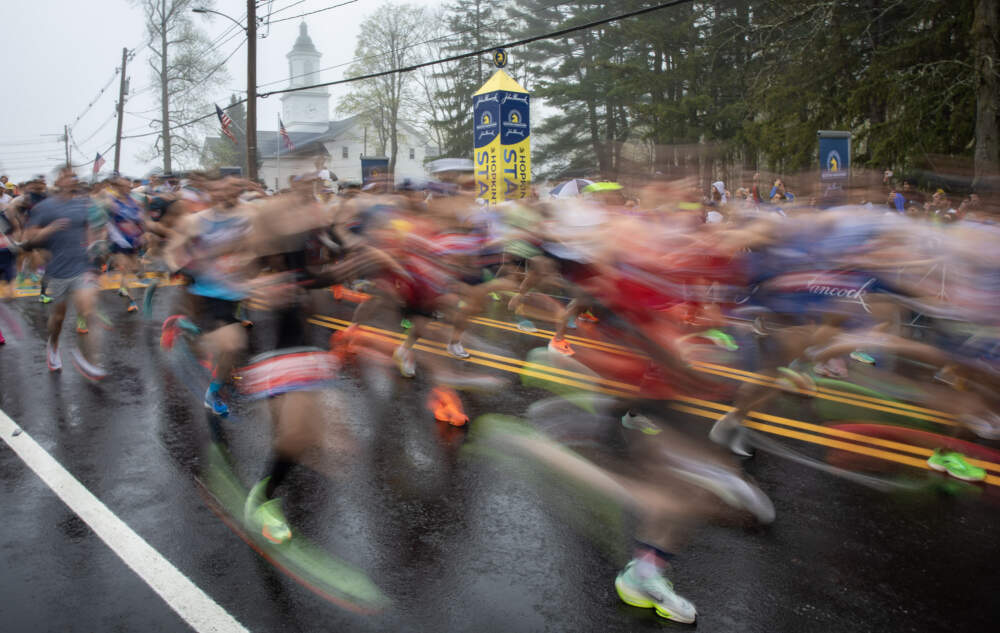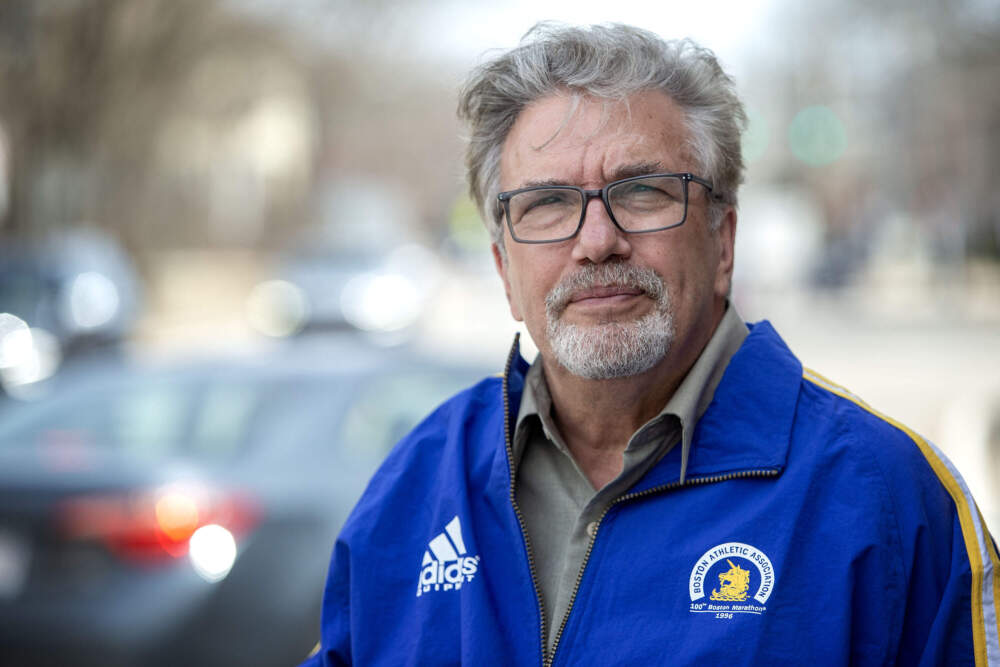Advertisement
Boston Marathon medical coordinator to retire after almost 50 years working the race
Resume
On Marathon Monday, 1,900 volunteers will staff medical tents along the Boston Marathon route and at the finish line. It's a vast operation that has saved lives and helped many thousands of runners and spectators who've gotten sick, injured or just plain worn down along the race course between Hopkinton and Boston.
And after it's over, the man who coordinates the medical coverage at the marathon will retire from the role after working the race for almost 50 years.
Chris Troyanos started as a volunteer in the medical tents in 1977. He went on to oversee athletic trainers. He took on the leadership role as marathon medical coordinator in 1996.
He's never run a marathon himself.
"Hell, no. Sorry. Not a chance," Troyanos said. "No, I'm not a runner. I'd rather take care of runners."

WBUR's All Things Considered host Lisa Mullins met Troyanos along the marathon route in Wellesley to talk about how he's helped race medicine evolve.
Troyanos said as the race approaches, what's tops on his mind is the weather. It's expected to be sunny and in the mid-50s to high-60s while the runners are on the course. The upper end of that temperature range concerns him, particularly when it comes to runners from New England, who are used to training in cooler weather.
Interview Highlights
On the weather for race day and concerns about warmth:
"It means we're going to see more medical encounters, the potential of some type of heat illness — specifically exertional heat stroke. So we're going to be working with our public safety partners, with also our runners and our athletes, kind of advising them about what to do and what to watch for ... you know, basically, dizziness, headache, nausea, that type of thing. They could be dehydrated.
On how heat stroke among runners is now treated:
"One of our protocols is that if someone comes into a tent, if they have exertional heat stroke, body core temperatures ranging from 104 to 108 [degrees] or even higher, that's a very dangerous situation. ... They can be unconscious, they can be delirious, they can be slightly lucid. So, you know, their core temperatures are up. And what's going on internally is when you're that hot, your blood is that hot.
"We do ice immersions in all of our course medical tents and our Boston tents. ... [The runner's] full body in a slurry of ice water, with, unfortunately, a rectal thermometer in the patient. ... At that point in time, [the person is] not going to know. ... But what we do is we have to assess what your temperature is. And with that, once we know what it is, then you're going in the tub. And then we, what we call, reverse cook you. So we bring your body core temperature down in a controlled manner, and then when you hit, say, 103 degrees, we take you out of the water. And if we don't, then we're looking at life threatening issues."
On the biggest changes since he started volunteering in the medical tents in 1977:
"[We have a] bigger medical team. I mean, back then there were maybe 50 or 60 medical volunteers. We have a very robust educational program, an outreach program. Our medical protocols are different from what a doctor and a nurse might be doing in their clinical settings.
"Prior to 2004, we didn't do as well a job as we do now in the coordination between public safety and our hospitals. So, I work with the Department of Public Health, Office of Emergency Management ... and all the different hospitals, their emergency rooms, their emergency preparedness coordinators, so that we're kind of in a seamless approach about what to do when these things happen.
"I've used this term well before 2013: That a marathon is what I would consider a planned mass casualty event. ... You've got to be prepared. You've got to be able to ramp up and deal with it. ... So when we're dealing with that, I mean, on a light day for us, we might see about [1,100 to 1,200] athletes throughout the course of the day. That's a light day. Now, on a heavier day, we've treated as many as 8% or 9% percent of the field."
On what he most remembers and what lessons were learned from the day of the marathon bombing in 2013:
"We never planned and never discussed what would happen if a bomb went off at the finish line. That was never in our lexicon of thought. But the response was heroic by so many different people. How many people from my medical tent went to that bomb site without even being told, that did heroic things, stopped people from bleeding, moved people out of it. They stayed and fought the fight. That's what I'll always hold.
"There wasn't as much — and this is probably my fault — there wasn't as much control as what needed to happen. I was always told that when you see a tragedy of that nature, you can't think of it as a chess match. You can't think two or three moves ahead. You almost have to look at it as a checkers game. So it's move and react, move and react. ... I was just reacting.
"The planning [now] is massive, but you know, security and terrorism still is a concern, even today, and particularly with what's going on around us in the world and domestically. It's always in the back of our mind. It hasn't and will never go away."
This segment aired on April 11, 2024.

